Abstract
OBJECTIVE: This study examined the effect of incarceration during pregnancy on infant birth weight. METHODS: North Carolina prison records were matched to North Carolina birth certificates and health services records to identify 94 women who were incarcerated during one pregnancy but not incarcerated during another pregnancy. Paired analyses examined differences between the pregnancies in terms of the women's characteristics and use of health services. A generalized estimating equations analysis modeled infant birth weight as a function of the number of days that a woman was incarcerated during pregnancy, accounting for the correlation between the birth weights of two infants born to the same mother and several potentially confounding variables. RESULTS: Since the women were significantly more likely to have been incarcerated during the second of the pair of pregnancies, as a group they were significantly older and had more children at the time of the incarcerated pregnancy than at the time of the home pregnancy. After controlling for important covariates, a higher number of pregnancy days spent incarcerated was found to be associated with higher infant birth weight. CONCLUSION: These findings suggest that aspects of the prison environment such as shelter and regular meals may enhance pregnancy outcomes among very high risk women. Health professionals should join others in efforts to assure that health-promoting resources such as adequate shelter, nutritional support, and substance abuse treatment programs are available to all pregnant women.
Full text
PDF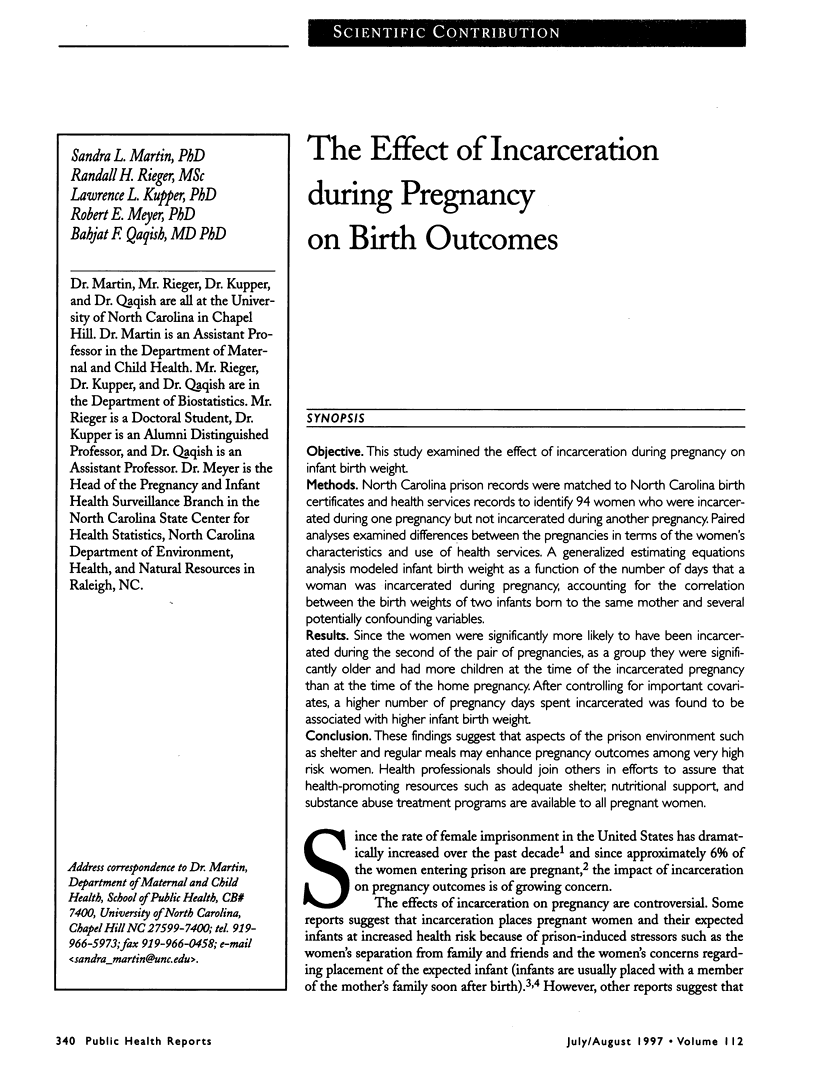
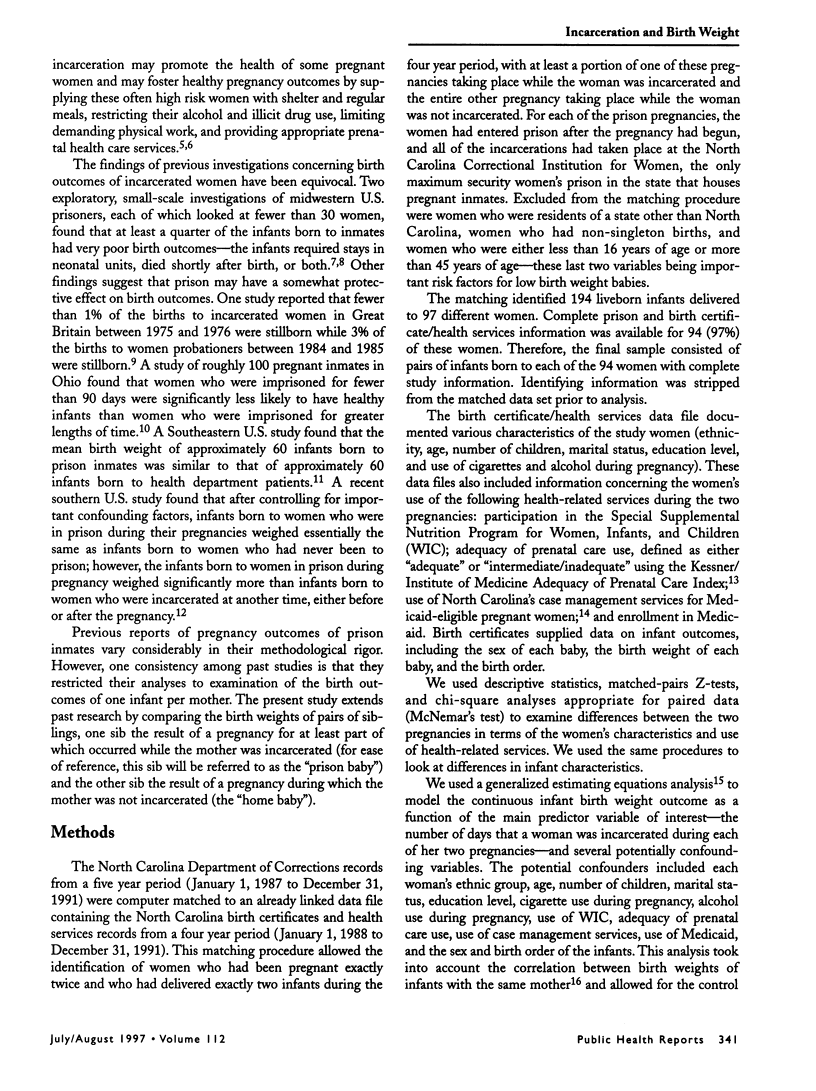
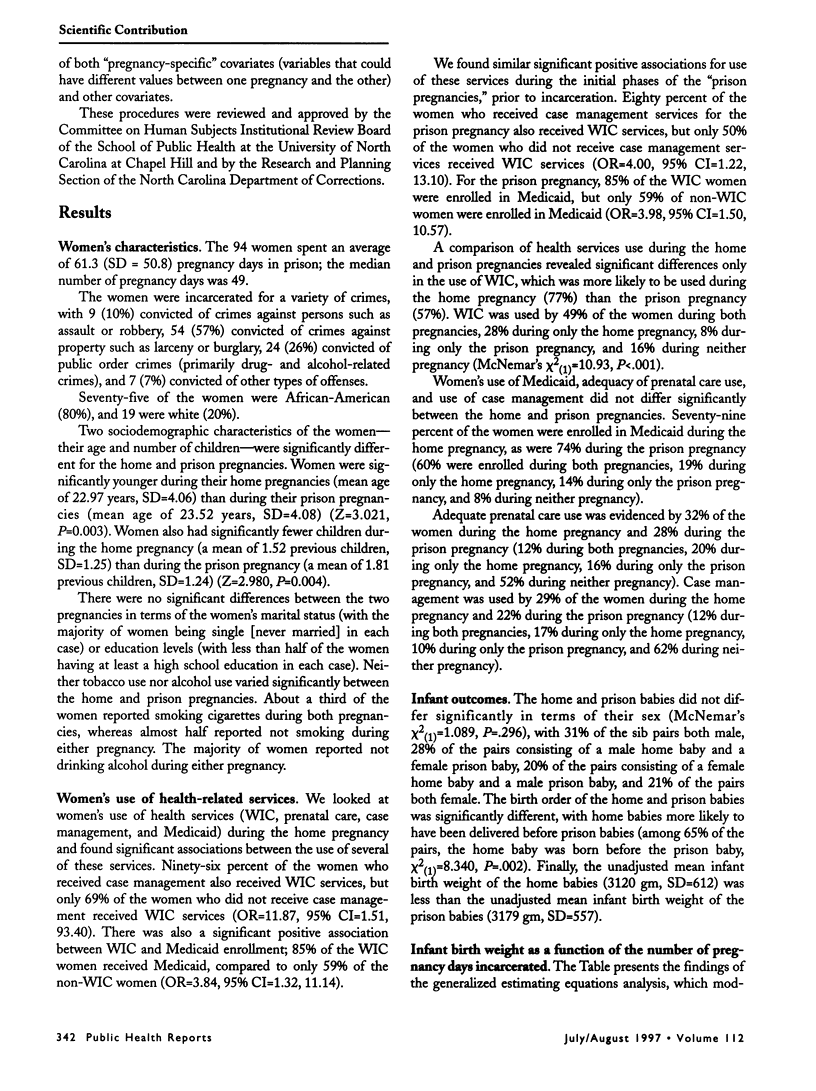
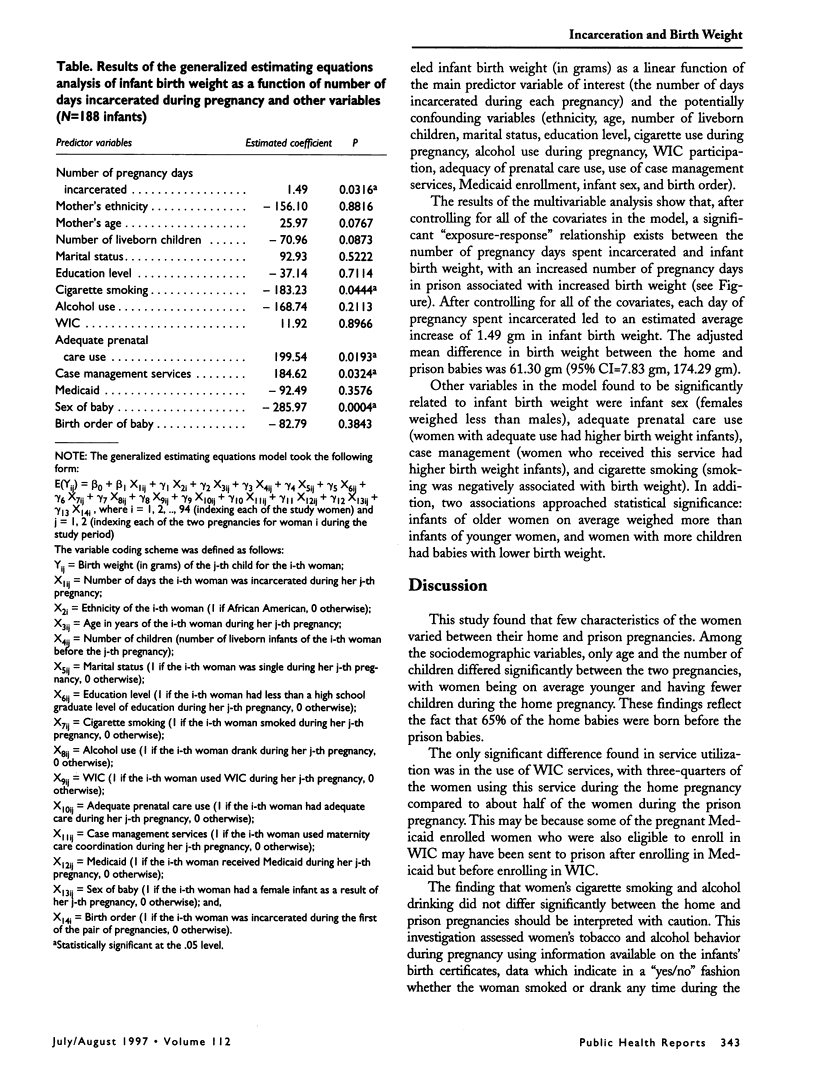
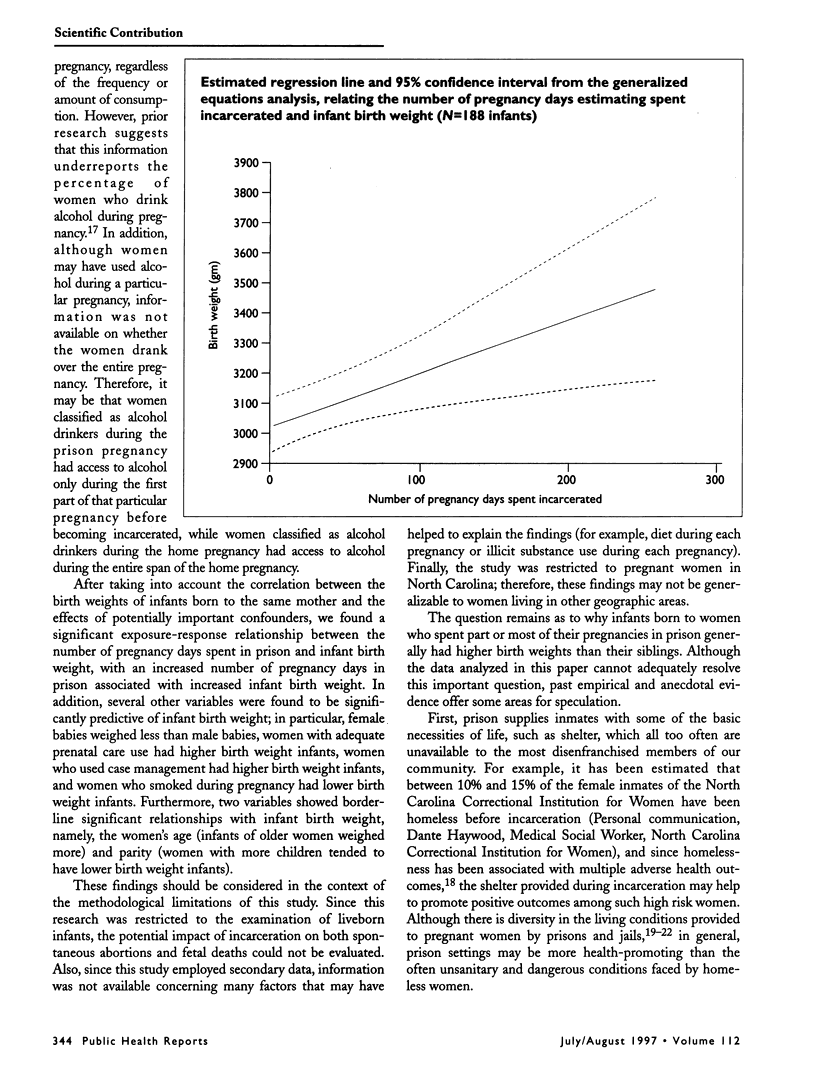
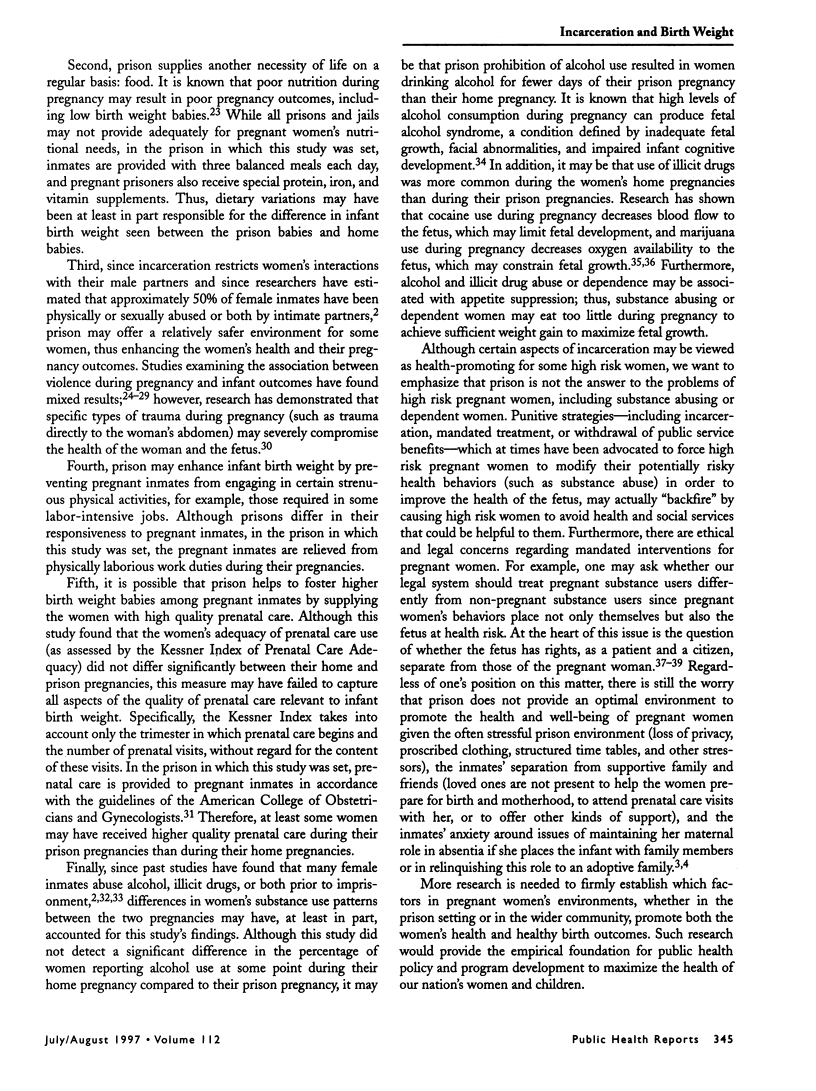
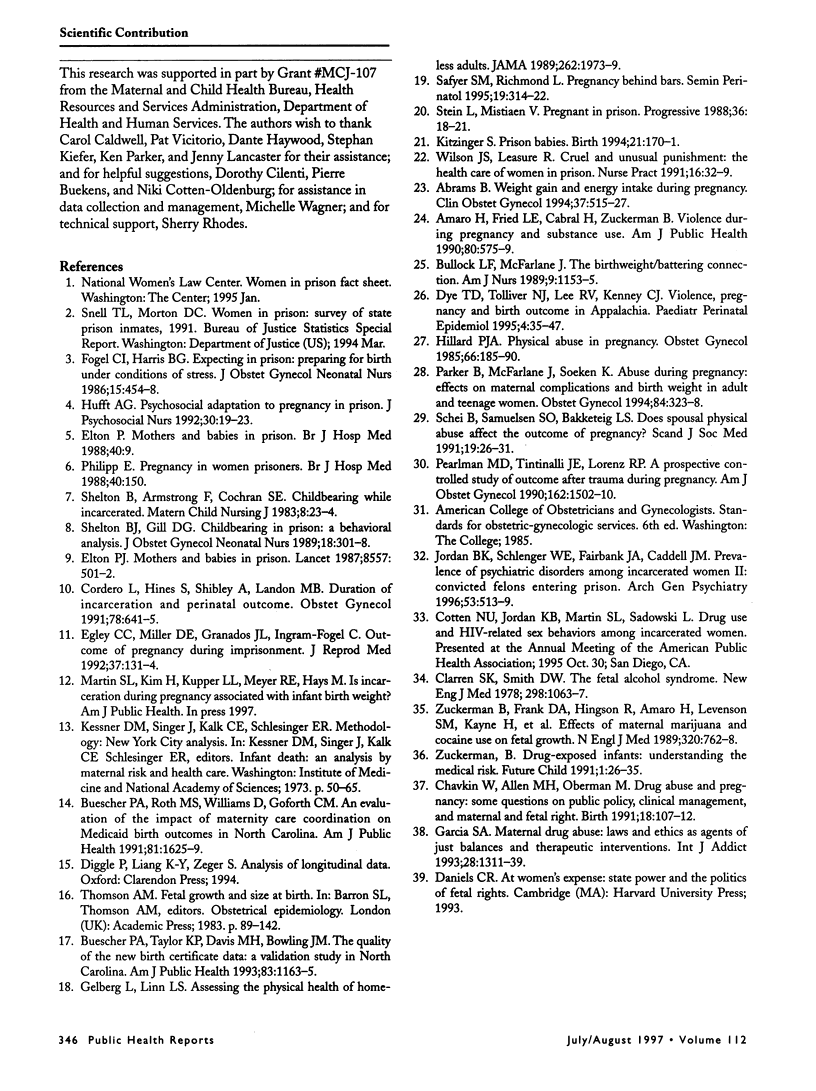
Selected References
These references are in PubMed. This may not be the complete list of references from this article.
- Abrams B. Weight gain and energy intake during pregnancy. Clin Obstet Gynecol. 1994 Sep;37(3):515–527. doi: 10.1097/00003081-199409000-00005. [DOI] [PubMed] [Google Scholar]
- Amaro H., Fried L. E., Cabral H., Zuckerman B. Violence during pregnancy and substance use. Am J Public Health. 1990 May;80(5):575–579. doi: 10.2105/ajph.80.5.575. [DOI] [PMC free article] [PubMed] [Google Scholar]
- Buescher P. A., Roth M. S., Williams D., Goforth C. M. An evaluation of the impact of maternity care coordination on Medicaid birth outcomes in North Carolina. Am J Public Health. 1991 Dec;81(12):1625–1629. doi: 10.2105/ajph.81.12.1625. [DOI] [PMC free article] [PubMed] [Google Scholar]
- Buescher P. A., Taylor K. P., Davis M. H., Bowling J. M. The quality of the new birth certificate data: a validation study in North Carolina. Am J Public Health. 1993 Aug;83(8):1163–1165. doi: 10.2105/ajph.83.8.1163. [DOI] [PMC free article] [PubMed] [Google Scholar]
- Bullock L. F., McFarlane J. The birth-weight/battering connection. Am J Nurs. 1989 Sep;89(9):1153–1155. [PubMed] [Google Scholar]
- Chavkin W., Allen M. H., Oberman M. Drug abuse and pregnancy: some questions on public policy, clinical management, and maternal and fetal rights. Birth. 1991 Jun;18(2):107–112. doi: 10.1111/j.1523-536x.1991.tb00070.x. [DOI] [PubMed] [Google Scholar]
- Clarren S. K., Smith D. W. The fetal alcohol syndrome. N Engl J Med. 1978 May 11;298(19):1063–1067. doi: 10.1056/NEJM197805112981906. [DOI] [PubMed] [Google Scholar]
- Cordero L., Hines S., Shibley K. A., Landon M. B. Duration of incarceration and perinatal outcome. Obstet Gynecol. 1991 Oct;78(4):641–645. [PubMed] [Google Scholar]
- Dye T. D., Tollivert N. J., Lee R. V., Kenney C. J. Violence, pregnancy and birth outcome in Appalachia. Paediatr Perinat Epidemiol. 1995 Jan;9(1):35–47. doi: 10.1111/j.1365-3016.1995.tb00117.x. [DOI] [PubMed] [Google Scholar]
- Egley C. C., Miller D. E., Granados J. L., Ingram-Fogel C. Outcome of pregnancy during imprisonment. J Reprod Med. 1992 Feb;37(2):131–134. [PubMed] [Google Scholar]
- Elton P. J. Mothers and babies in prison. Lancet. 1987 Aug 29;2(8557):501–502. doi: 10.1016/s0140-6736(87)91804-6. [DOI] [PubMed] [Google Scholar]
- Elton P. J. Mothers and babies in prison. Br J Hosp Med. 1988 Jan;39(1):9–9. [PubMed] [Google Scholar]
- Fogel C. I., Harris B. G. Expecting in prison: preparing for birth under conditions of stress. J Obstet Gynecol Neonatal Nurs. 1986 Nov-Dec;15(6):454–458. doi: 10.1111/j.1552-6909.1986.tb01421.x. [DOI] [PubMed] [Google Scholar]
- Garcia S. A. Maternal drug abuse: laws and ethics as agents of just balances and therapeutic interventions. Int J Addict. 1993 Nov;28(13):1311–1339. doi: 10.3109/10826089309062190. [DOI] [PubMed] [Google Scholar]
- Gelberg L., Linn L. S. Assessing the physical health of homeless adults. JAMA. 1989 Oct 13;262(14):1973–1979. [PubMed] [Google Scholar]
- Hillard P. J. Physical abuse in pregnancy. Obstet Gynecol. 1985 Aug;66(2):185–190. [PubMed] [Google Scholar]
- Hufft A. G. Psychosocial adaption to pregnancy in prison. J Psychosoc Nurs Ment Health Serv. 1992 Apr;30(4):19–22. doi: 10.3928/0279-3695-19920401-08. [DOI] [PubMed] [Google Scholar]
- Jordan B. K., Schlenger W. E., Fairbank J. A., Caddell J. M. Prevalence of psychiatric disorders among incarcerated women. II. Convicted felons entering prison. Arch Gen Psychiatry. 1996 Jun;53(6):513–519. doi: 10.1001/archpsyc.1996.01830060057008. [DOI] [PubMed] [Google Scholar]
- Kitzinger S. Sheila Kitzinger's letter from England: prison babies. Birth. 1994 Sep;21(3):170–171. doi: 10.1111/j.1523-536x.1994.tb00517.x. [DOI] [PubMed] [Google Scholar]
- Parker B., McFarlane J., Soeken K. Abuse during pregnancy: effects on maternal complications and birth weight in adult and teenage women. Obstet Gynecol. 1994 Sep;84(3):323–328. [PubMed] [Google Scholar]
- Pearlman M. D., Tintinallli J. E., Lorenz R. P. A prospective controlled study of outcome after trauma during pregnancy. Am J Obstet Gynecol. 1990 Jun;162(6):1502–1510. doi: 10.1016/0002-9378(90)90913-r. [DOI] [PubMed] [Google Scholar]
- Philipp E. Pregnancy in women prisoners. Br J Hosp Med. 1988 Aug;40(2):150–150. [PubMed] [Google Scholar]
- Safyer S. M., Richmond L. Pregnancy behind bars. Semin Perinatol. 1995 Aug;19(4):314–322. doi: 10.1016/s0146-0005(05)80047-3. [DOI] [PubMed] [Google Scholar]
- Schei B., Samuelsen S. O., Bakketeig L. S. Does spousal physical abuse affect the outcome of pregnancy? Scand J Soc Med. 1991 Mar;19(1):26–31. doi: 10.1177/140349489101900105. [DOI] [PubMed] [Google Scholar]
- Shelton B. J., Gill D. G. Childbearing in prison: a behavioral analysis. J Obstet Gynecol Neonatal Nurs. 1989 Jul-Aug;18(4):301–308. doi: 10.1111/j.1552-6909.1989.tb01623.x. [DOI] [PubMed] [Google Scholar]
- Shelton B., Armstrong F., Cochran S. E. Childbearing while incarcerated. MCN Am J Matern Child Nurs. 1983 Jan-Feb;8(1):23–24. [PubMed] [Google Scholar]
- Wilson J. S., Leasure R. Cruel and unusual punishment: the health care of women in prison. Nurse Pract. 1991 Feb;16(2):32, 34, 36-9. [PubMed] [Google Scholar]
- Zuckerman B., Frank D. A., Hingson R., Amaro H., Levenson S. M., Kayne H., Parker S., Vinci R., Aboagye K., Fried L. E. Effects of maternal marijuana and cocaine use on fetal growth. N Engl J Med. 1989 Mar 23;320(12):762–768. doi: 10.1056/NEJM198903233201203. [DOI] [PubMed] [Google Scholar]


